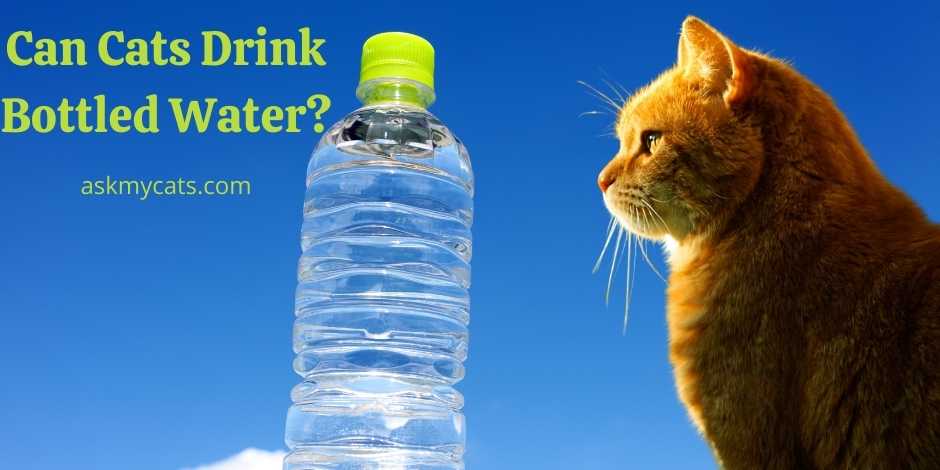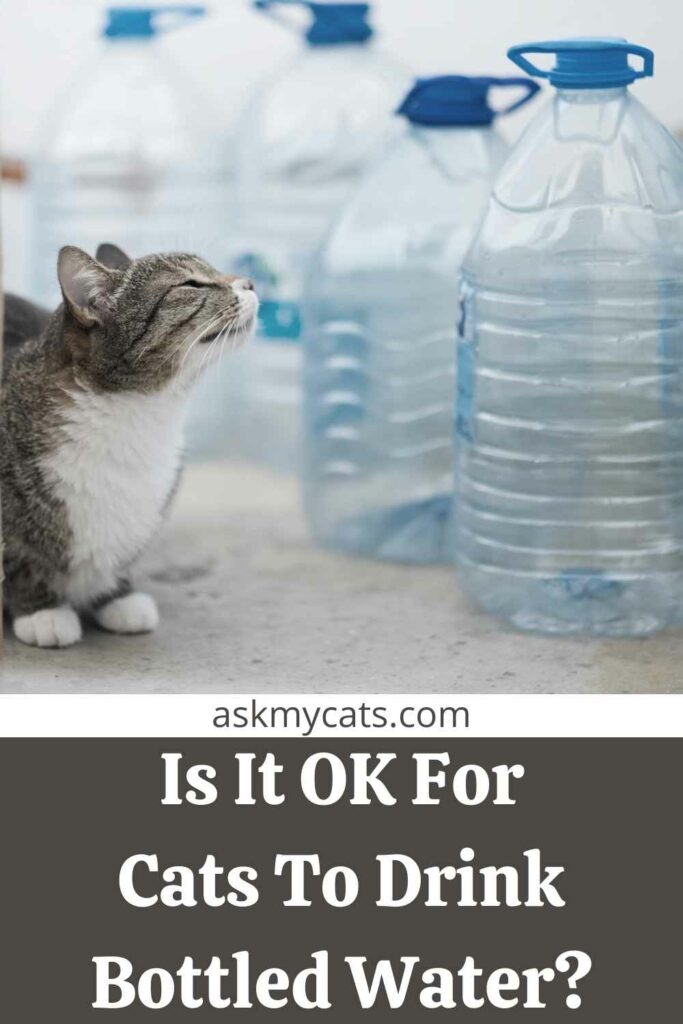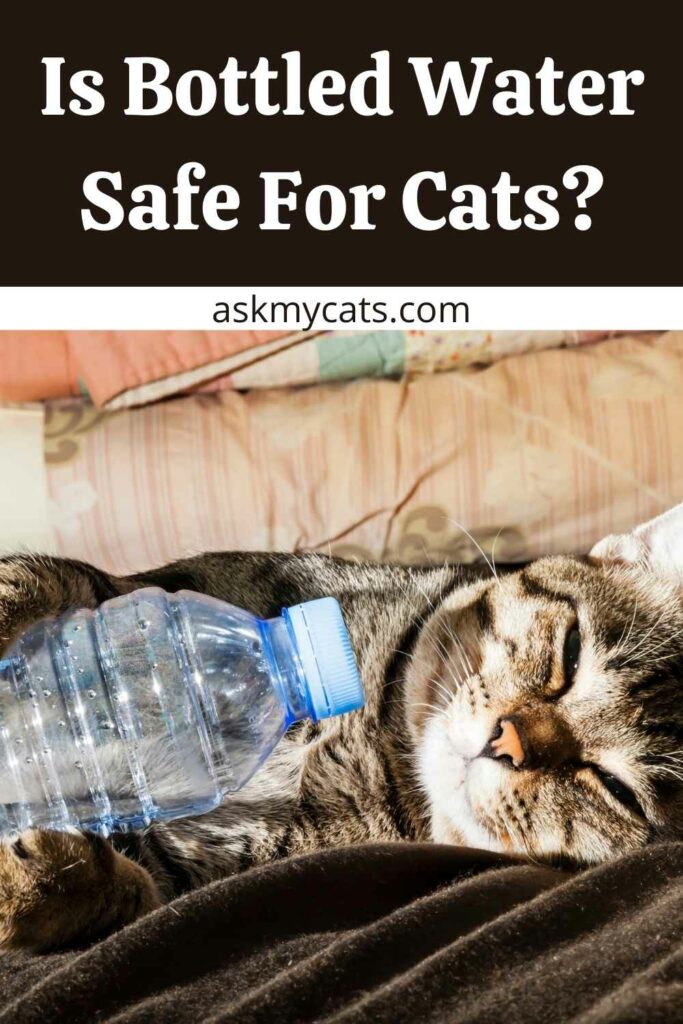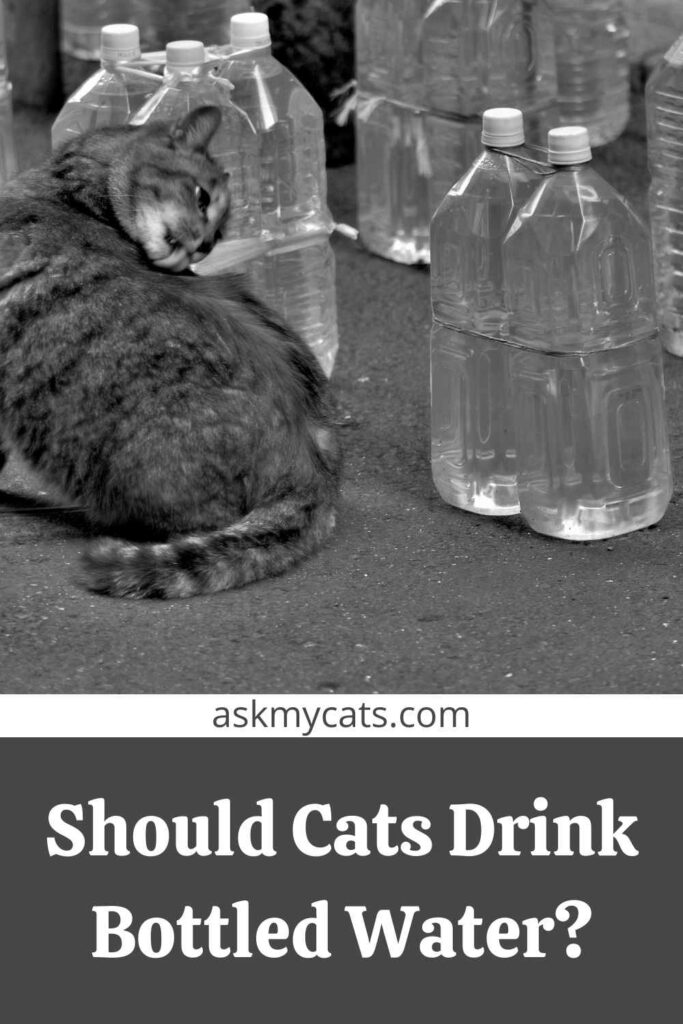A cat must drink water in order for their organism, which is about 70% water, to function correctly. Water is required to maintain their body temperature steady, as well as for digestion and vitamin and mineral absorption. This is something we are all aware of.
Bottled water for cats may be an alternative if a cat’s owner makes the appropriate decision.
Natural water of the highest category from subterranean sources is the best alternative, and this should be mentioned on the box. If an owner does not want to spend money on water, filtered water or tap water maintained in a firmly covered container for 6-8 hours is preferable.


Give Your Cat the Perfect Day
Get the Free Ebook!
Is It OK For Cats To Drink Bottled Water?
It is safe for cats to drink bottled water because it is not harmful for cats.

Our four-legged buddies, on the other hand, are descended from an African wild cat and have a genetically impaired sense of thirst. Cats can drink a small amount of water, and if their owners serve them wet food, they may not drink at all. This implies that health issues such as urinary tract infections, renal troubles, and overall organism problems may emerge.
Chemical techniques remove numerous contaminants from bottled water in addition to filtering. This is dependent on the firm that makes it. Spring water, well water, tap water, bottled water, and distilled water are the five fundamental types of water.
Spring and well water are derived from the earth’s aquifer, rain and melting ice, tap water is derived from rainwater collected in reservoirs, bottled water is derived from commercial firms, and distilled water is derived from commercial companies as well. Water from springs and wells is the purest, and if not bottled, it is unfiltered and untreated. Fluoride and other chemicals are added to tap water, which is also filtered.
Finally, distilled water is prepared by boiling ordinary water and catching the vapour in sterile containers under pressure. Most contaminants, as well as vital electrolytes and minerals, are eliminated in this way. There are numerous contradicting articles concerning the advantages and risks of distilled water if you go “online.”
This includes anything from treating urinary tract infections to generating infections and stones, producing and/or treating heart problems, and even causing and/or treating tear stains, among other things. So, which is the best option for your pets? Spring water, which is derived from springs, is not as pure as it appears. Animals urinate and defecate in the “upstream” rivers that form “downstream” springs.
In general, the safest water is filtered and treated water from any source suitable for human use. Distilled water is not suggested, according to the findings of my investigation. Despite the fact that all commercially produced cat meals contain the majority of electrolytes and minerals necessary for good health, many pets do not have well-balanced diets.
Regular water consumption is not only crucial for optimal hydration, but it also provides your pet with the minerals and electrolytes that he or she may need if he or she is a picky eater. Remember to provide your cats plenty of fresh drinking water on a regular basis, the same water that you consume.
Is Bottled Water Safe For Cats?
Yes, bottled water is safe for cats. But you need to look out the quality of plastic of the bottled water.

Ordinary bottled water can be polluted, although it typically isn’t, and any water from a plastic container, including distilled water, which has no minerals and no chlorine, can contain micro plastics.
Many types of home water filters, including Reverse Osmosis systems, filter out a wide range of contaminants, including minerals, organic compounds, bacteria, and chlorine. Each filter brand is designed to filter out a certain collection of components.
Your cat will be happy with tap water if it is safe for you to drink. Some cats prefer to drink from a glass or a fountain rather than from a dish. Our younger tabby prefers to drink from a faucet, but if her human assistants aren’t there, she will drink from a glass.
Cats don’t care what sort of water you have; they aren’t picky.
For cats, premium bottled water from a natural source is preferable. The difference between tap water and mineral water is immediately discernible. Your cat will be able to distinguish between different water sources as well.
Your cat will benefit from hydration that is devoid of the pollutants present in tap water if you purchase natural spring water. This minimizes the chances of your cat going away from the water after sniffing it.
Although mineral water is superior to tap water, it is not the best option. As previously said, not all mineral water is created equal. You should concentrate on increasing the quality of tap water unless you are purchasing a reputable brand.
Should Cats Drink Bottled Water?
Drinking water bottled fresh from a spring is better for cats because it is chemical-free. Plastic bottles, on the other hand, may leach dangerous chemicals and poisons into the water supply. Give your cat spring water from a glass or cardboard carton, or a bottle made of polyethylene terephthalate (PET).

It’s not always as easy as we’d like to persuade a kitty to drink enough water. Because you dislike tap water, you may ask if bottled spring water is a better alternative. It may seem extravagant to buy bottles of Evian water for cats, but it is occasionally vital to keep your cat hydrated.
Avoid making fruit-infused water your go-to beverage. If cats become accustomed to this aroma, they will be less likely to drink ordinary water, even in an emergency like dehydration. Furthermore, fruit-infused water has the potential to be sticky. Cats are efficient drinkers who produce little waste and spillage. Water can and can adhere to a cat’s snout, attracting flies with its taste.
That doesn’t rule out the possibility of flavouring your cat’s water yourself. Infusing tap water with fruit scent may entice cats to drink. The scent will draw curiosity while masking any existing copper or chlorine odours.
Domesticated cats have a natural aversion to standing water. Cats in the wild drink from streams so that it can ensure a constant supply of water. This explains why many cats have an odd inclination to drink from the toilet.
There might be another reason for your cat’s refusal to drink from the tap. Consider whether any of the following reasons justify your failure to hydrate before spending money on mineral water and polluting your house with plastic.
Cats, as previously said, are only interested in clean, pure water. This implies that anything left out for more than an hour may be considered filthy or stagnant.
Cats are inquisitive creatures, and spicy odours may appeal to them as a way to make water more fascinating. However, it’s more likely that the cat will be uninterested in the water. If another cat has used the bowl, this becomes more likely.
Best Bottled Water For Cats
Bottled water collected from a natural source is the best option for your cat.
Why Does My Cat Like Bottled Water?
Your cat likes bottled water because they are attracted by the bottles.
Luckily, they come in a variety of sizes, such as this 64-ounce water container, which may fit animals ranging in size from guinea pigs to dogs. A water bottle may be suitable for your cat, depending on its mobility and ability to aim. Water bottles may also result in fewer spills and cleaner water.
Frequently Asked Questions
Can well water cause crystals in cats?
Toxins, minerals, and urinary irritants that might cause issues are diluted by larger urine water content. Irritants can lead to persistent bladder inflammation, and concentrated urine is more prone to produce crystals and urinary stones.
Can I give my cat bottled water?
Avoid using plastic water dishes for your cat since they can leak foul-tasting chemicals into the water and make bacteria easier to spread. Bottled water should also be avoided by cats.
How can I help my cat with urinary crystals?
Crystals in cats that are prone to them may be reduced by feeding a proven therapeutic diet for urinary tract care. If struvite urolith stones are present, your veterinarian may prescribe a therapeutic diet that controls and dissolves the stones while also avoiding the production of calcium oxalate uroliths.
Final Words
Finding a technique to keep your cat hydrated is the most crucial thing. If your cat still refuses to drink still water, think about why that is, and consider moving your cat’s dish or the location where it is kept. You should generally avoid plastic bottles for storing your cat’s water because it contains harmful chemicals.
If you have any questions, leave it in the comments section below.
